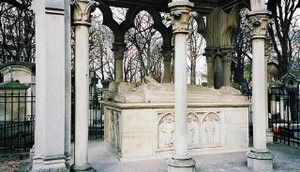Discovering Long-Lost Lovers in Paris

- SUBSCRIBE
- ALREADY SUBSCRIBED?
BECOME A BONJOUR PARIS MEMBER
Gain full access to our collection of over 5,000 articles and bring the City of Light into your life. Just 60 USD per year.
Find out why you should become a member here.
Sign in
Fill in your credentials below.
 Paris has always been the capital of romance, right? Some of us might connect it with the fairy tales we were read as children. But in true Gallic style, the course of true love doesn’t run smooth. For the French, it has to involve tragedy and obstacles and it probably doesn’t end happily either. One of the most captivating and hopeless French romances comes to us from the Middle Ages, immortalised in the letters left by the lovers. I was reminded of it whilst taking a walk in the Pere Lachaise cemetery….
Paris has always been the capital of romance, right? Some of us might connect it with the fairy tales we were read as children. But in true Gallic style, the course of true love doesn’t run smooth. For the French, it has to involve tragedy and obstacles and it probably doesn’t end happily either. One of the most captivating and hopeless French romances comes to us from the Middle Ages, immortalised in the letters left by the lovers. I was reminded of it whilst taking a walk in the Pere Lachaise cemetery….
Imagine the scandal in 12th-century Paris when bright clerical scholar Abelard spots young Heloise, herself highly educated and brilliant, in the small closed ecclesiastical world of learning centred around Notre Dame. On pretext of becoming her tutor, he gains entrance into the home of her guardian uncle Fulbert and seduces her. Though technically not a monk, it’s expected that a prominent scholar belongs to the church, not the flesh. Any transgression will be the ruin of his brilliant theological career—he’s playing with fire.
Lust turns to love, and Abelard grows careless, neglects his duties, and starts composing love songs for Heloise that are spread around Paris faster than you can say “trouble”. All Paris knows before uncle Fulbert, but soon enough they are discovered.
 Our lovers are forced apart, but they continue their affair with even more secrecy. Heloise is soon pregnant and they elope to Abelard’s relatives, where Heloise gives birth to a son. Months later, Abelard approaches uncle Fulbert to ask to marry Heloise, on the condition it remain secret, so as not to compromise his academic career. They’re in a tricky situation; marriage would soften the scandal of the premarital sex, but it’s also scandalous to have a man so connected with the church marry at all. Fulbert agrees to the marriage and Heloise returns to live with her uncle, though before long he’s made the marriage public. Heloise denies it for Abelard’s sake rather than her “reputation”, and Fulbert is so angry he beats her. Abelard takes her away and, for safety, hides her at a nunnery.
Our lovers are forced apart, but they continue their affair with even more secrecy. Heloise is soon pregnant and they elope to Abelard’s relatives, where Heloise gives birth to a son. Months later, Abelard approaches uncle Fulbert to ask to marry Heloise, on the condition it remain secret, so as not to compromise his academic career. They’re in a tricky situation; marriage would soften the scandal of the premarital sex, but it’s also scandalous to have a man so connected with the church marry at all. Fulbert agrees to the marriage and Heloise returns to live with her uncle, though before long he’s made the marriage public. Heloise denies it for Abelard’s sake rather than her “reputation”, and Fulbert is so angry he beats her. Abelard takes her away and, for safety, hides her at a nunnery.
This is the final straw for Uncle Fulbert. Believing Abelard means to cast off Heloise, he tracks him down and has him castrated. Cruelly and permanently separated in this way, Abelard suggests she enter a convent and he retires into a monastery soon after.
Heloise wrote years later: “You know, beloved, as the whole world knows, how much I have lost in you, how at one wretched stroke of fortune that supreme act of flagrant treachery robbed me of my very self in robbing me of you; and how my sorrow for my loss is nothing compared with what I feel for the manner in which I lost you.”
They stay connected by letter until their deaths, though Abelard changes after his castration and seems to wish to put their romance behind him. This has led many later feminist writers to suggest that he never loved her.
Heloise was unrepentant: “If Augustus, ruling over the whole world, were to deem me worthy of the honour of marriage, and to confirm the whole world to me, to be ruled by me forever, dearer to me and of greater dignity would it seem to be called thy strumpet* than his Empress.”
Yet more spoilsports suggest the whole thing is a kind of hoax, a later literary invention. Frankly, I don’t think it much matters—several of Heloise’s letters give chills in their passionate declaration of an unrepentant and complete devotion to another person. In so doing, she was going expressly against all religious and moral dogma of the times and asserting her own sexual and emotional needs in a time which recognised neither.
The letters move us, as all good love stories should, and in them we find courage and inspiration. If in fact they are forgeries, the author deserves the recognition given to the creators of other immortal lovers such as Dante & Beatrice.
Abelard and Heloise are buried together in Pere Lachaise Cemetary, Paris. You can buy copies of their letters at any good bookshop, or at www.amazon.com.
Père Lachaise 15, blvd de Ménilmontant, in the 20th, near metro Philippe Auguste, Pere Lachaise or Gambetta. Mon–Fri, 8–6; Sat, 8:30–6; Sun (and holidays), 9–6
 For more information: consult Girls’ Guide To Paris. Bonjour Paris premium members are entitled to a 10% discount on the group’s guided tours.
For more information: consult Girls’ Guide To Paris. Bonjour Paris premium members are entitled to a 10% discount on the group’s guided tours.
If you’re coming to France (or for that matter anywhere) you can reserve your hotel here. To rent a car, Bonjour Paris recommends Auto Europe.
Please post your comments or questions and let them flow. Register HERE to do so if you need a Bonjour Paris user name and password.
More in Bonjour Paris, French history, French tourism, histoire paris, Paris history, Paris memories, Paris sightseeing, sightseeing


